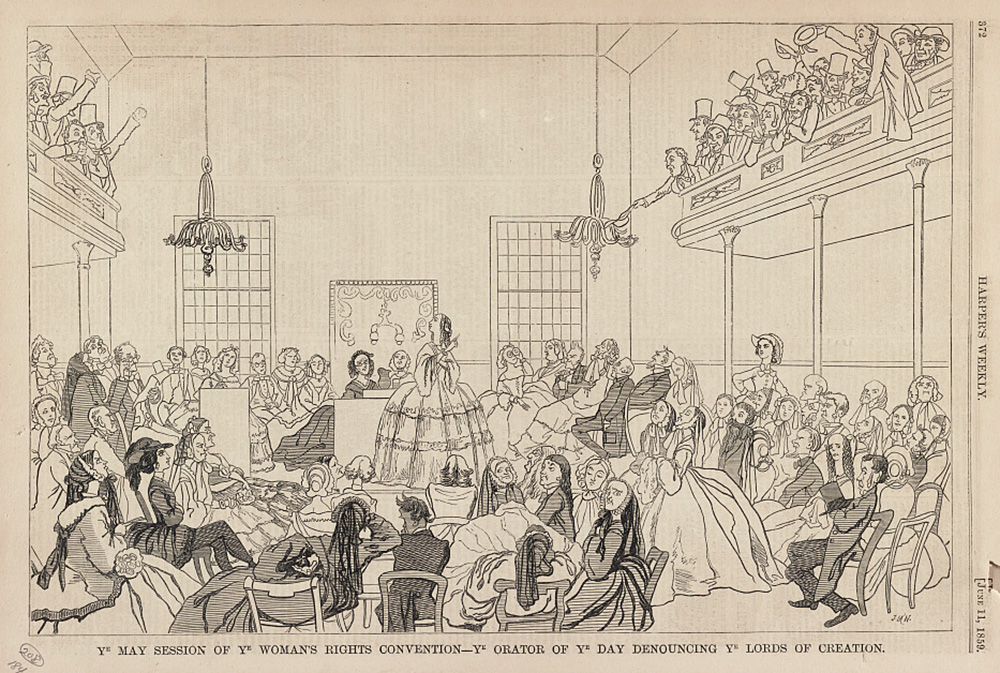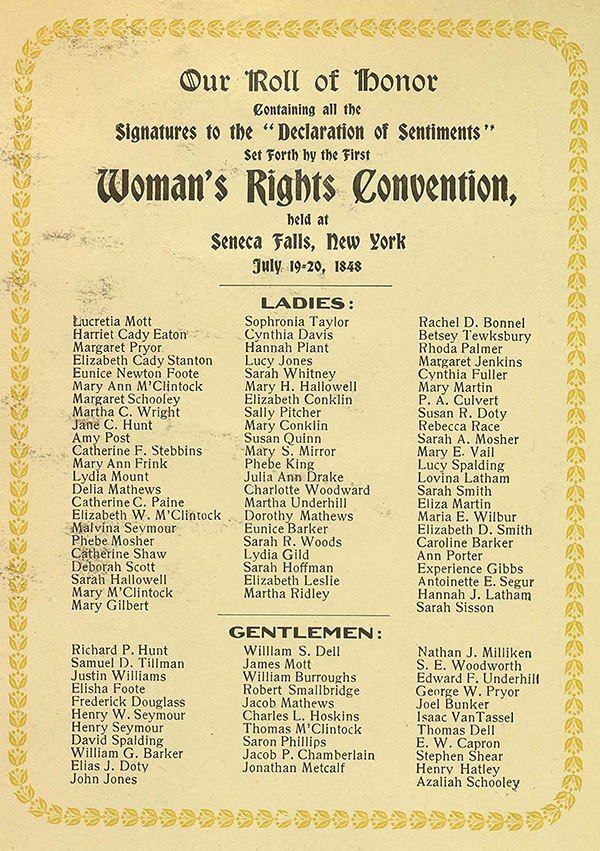
Despite the support of a number of men in the decade following the first women's rights meeting in Seneca Falls, New York, the conventions that were held throughout the North and West often received unsympathetic reports in the press and encountered disruptive groups in the lecture hall. On June 11, 1859, the New York-based newspaper
Harper's Weekly published a wood engraving mocking the annual conventions, with men in both galleries heckling and interrupting the woman at the dais.
See large image courtesy of Library of Congress.
Despite the support of a number of men in the decade following the first women's rights meeting in Seneca Falls, New York, the conventions that were held throughout the North and West often received unsympathetic reports in the press and encountered disruptive groups in the lecture hall. On June 11, 1859, the New York-based newspaper
Harper's Weekly published a wood engraving mocking the annual conventions, with men in both galleries heckling and interrupting the woman at the dais.
See large image courtesy of Library of Congress. The first women’s rights convention was organized by Elizabeth Cady Stanton and a number of Quaker women in Seneca Falls, New York. They aimed to open discussion among the roughly 300 attendees concerning the rights and conditions of women in society, religion, and politics. The event spanned two days of speeches and discourse and was open to both sexes, but men were to remain silent observers for the first day’s events.
The convention’s Declaration of Sentiments, written by Stanton, was the centerpiece of discussion. Based on the Declaration of Independence, there were 15 resolutions which taken together called for sexual equality in society at large – including a woman’s right to vote. Attendees heard, discussed, and then opted to sign the declaration or abstain in dissension. Nearly all points were readily agreed to, except for the question of suffrage, which prompted a heated argument.
On the second day, Frederick Douglass, the only African American present, spoke in favor of woman suffrage to the assembled crowd. “In this denial of the right to participate in government, not merely the degradation of woman and the perpetuation of a great injustice happens,” he argued, “but the maiming and repudiation of one-half of the moral and intellectual power of the government of the world.”
Excerpt from the 1848 Declaration of Sentiments
 List of signatures from the Declaration of Sentiments 1848. (Courtesy of Wikimedia Commons)
Enlarge Image
List of signatures from the Declaration of Sentiments 1848. (Courtesy of Wikimedia Commons)
Enlarge Image  “…The history of mankind is a history of repeated injuries and usurpations on the part of man toward woman, having in direct object the establishment of an absolute tyranny over her. To prove this, let facts be submitted to a candid world.
“…The history of mankind is a history of repeated injuries and usurpations on the part of man toward woman, having in direct object the establishment of an absolute tyranny over her. To prove this, let facts be submitted to a candid world.
-
He has never permitted her to exercise her inalienable right to the elective franchise.
-
He has compelled her to submit to laws, in the formation of which she had no voice.
-
He has withheld from her rights which are given to the most ignorant and degraded men – both natives and foreigners.
-
Having deprived her of this first right of a citizen, the elective franchise, thereby leaving her without representation in the halls of legislation, he has oppressed her on all sides.
-
He has made her, if married, in the eye of the law, civilly dead.
-
He has taken from her all right in property, even to the wages she earns.
-
He has made her, morally, an irresponsible being, as she can commit many crimes with impunity, provided they be done in the presence of her husband. In the covenant of marriage, she is compelled to promise obedience to her husband, he becoming, to all intents and purposes, her master – the law giving him power to deprive her of her liberty, and to administer chastisement.
-
He has so framed the laws of divorce, as to what shall be the proper causes, and in case of separation, to whom the guardianship of the children shall be given, as to be wholly regardless of the happiness of women – the law, in all cases, going upon a false supposition of the supremacy of man, and giving all power into his hands.
-
After depriving her of all rights as a married woman, if single, and the owner of property, he has taxed her to support a government which recognizes her only when her property can be made profitable to it.
-
He has monopolized nearly all the profitable employments, and from those she is permitted to follow, she receives but a scanty remuneration. He closes against her all the avenues to wealth and distinction which he considers most honorable to himself. As a teacher of theology, medicine, or law, she is not known.
-
He has denied her the facilities for obtaining a thorough education, all colleges being closed against her.
-
He allows her in church, as well as state, but a subordinate position, claiming apostolic authority for her exclusion from the ministry, and, with some exceptions, from any public participation in the affairs of the church.
-
He has created a false public sentiment by giving to the world a different code of morals for men and women, by which moral delinquencies which exclude women from society, are not only tolerated, but deemed of little account in man.
-
He has usurped the prerogative of Jehovah himself, claiming it as his right to assign for her a sphere of action, when that belongs to her conscience and to her God.
-
He has endeavored, in every way that he could, to destroy her confidence in her own powers, to lessen her self-respect, and to make her willing to lead a dependent and abject life.
Now, in view of this entire disfranchisement of one-half the people of this country, their social and religious degradation – in view of the unjust laws above mentioned, and because women do feel themselves aggrieved, oppressed, and fraudulently deprived of their most sacred rights, we insist that they have immediate admission to all the rights and privileges which belong to them as citizens of the United States.”
Next:
The Election of 1912 >